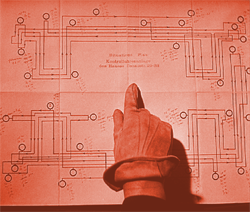Technographies: new book series from Open Humanities Press
 Wednesday, October 22, 2014 at 9:01AM
Wednesday, October 22, 2014 at 9:01AM In celebration of Open Access Week, we are pleased to announce a new open access book series, Technographies, edited by Steven Connor, David Trotter and James Purdon.
 According to Aristotle, the modes taken by the ‘art of representation’ (mimesis) differ in ‘means’, ‘object’, and ‘manner’. Some translations offer ‘medium’ instead of ‘means’, as though Aristotle had seen McLuhan coming from a very long way off. Others have argued that the term poses the question ‘in what?’: in what (language, genre, form, etc.) has expression taken place? ‘Through what?’ might instead be the question for a series which aims to explore the cultural (written) history of material technologies.
According to Aristotle, the modes taken by the ‘art of representation’ (mimesis) differ in ‘means’, ‘object’, and ‘manner’. Some translations offer ‘medium’ instead of ‘means’, as though Aristotle had seen McLuhan coming from a very long way off. Others have argued that the term poses the question ‘in what?’: in what (language, genre, form, etc.) has expression taken place? ‘Through what?’ might instead be the question for a series which aims to explore the cultural (written) history of material technologies.
Technographies aims to answer the question ‘through what?’ in a variety of ways, with varying degrees of literalness. The term itself seeks to recuperate some of the strangeness that has been lost in the course of the long naturalization of ‘technology’. Originally a genre of writing — a treatise on a practical art or craft — a ‘technology’ soon came to denote the end product of such arts and crafts, and eventually became associated with the machinery or equipment used in production. Today, we tend to assume that a ‘technology’ is a machine, a system, a piece of kit: a term for a discourse or a way of thinking has over the centuries been transformed into a term for an object, or a set of objects.
By contrast, the term ‘technography’ came into use during (and possibly in reaction to) the late-nineteenth-century turn from words to things. A technography is a description of technologies and their application with primary regard to social context. Technography, itself technologically mediated like all forms of writing, is a reflection upon the varying degrees to which all technologies have in some fashion been written into being. It examines the crucial role writing has played, not just in the description of technological objects and their functions, but in the inscription of technologies within social and cultural life.
Technographies aims to encourage investigation of a wide variety of writing ‘about’ technology. It is not committed to the furtherance of any single methodology, nor is it period-specific; instead contributions are sought that will develop new, ambitious and scholarly approaches to technological mediation using the tools of literary criticism, theoretical elaboration, rhetoric, poetics, gender studies and queer theory, material culture, media archaeology, the history of science, and similar disciplines.
How was it that technology and writing came to inform each other so extensively that today there is only information? Technographies seeks to answer that question by putting the emphasis on writing as an answer to the large question of ‘through what?’. Writing about technographies in history, our contributors will themselves write technographically.
To contribute to the series, please contact Steven Connor![]() , David Trotter
, David Trotter![]() or James Purdon
or James Purdon![]()
Advisory Board
- Emmanuelle André (Paris Diderot)
- Edward Dimendberg (University of California, Irvine)
- Sebastian Gießmann (University of Siegen)
- John Guillory (NYU)
- Jondi Keane (Deakin University, Melbourne)
- Tanya Krzywinska (Falmouth University)
- Charlotte Sleigh (University of Kent)
- Susan Merrill Squier (Penn State University)
- Sherry Turkle (MIT)
- Gregory L. Ulmer (University of Florida)







Reader Comments